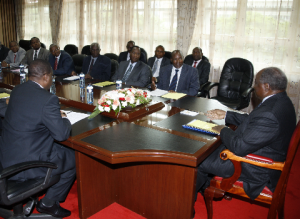The only way to lure more youths in agriculture is by making it more "sexy" is a statement that has been repeatedly said to the point it was no shocker when the office of the deputy president went ahead and shared their thoughts on twitter concerning the same
The question that constantly lingers in my mind is, will the use of such words/ expressions really help change people's mentality towards the same? Shouldn't we be addressing the issues of young people disinterest in agriculture and more so, what the current pitfalls those already in the farming game are facing?
What exactly is this swag they are talking about?
Is it the swag of being seen on the social media channels as being the first one to use lots of coined "sexy" acronyms in agriculture just for the sake of it,
OR
Is it swag that offers conducive environment for young people to venture in to farming just like any other business........access to credit facilities, land, markets and such
Is it the swag that students in the educational institutions are presented with, that they end of dropping any agricultural related courses for Economics or other hyped courses in the institutions?
OR
The youth must bring in their swag into agriculture in order to accelerate our economic growth.
— William Samoei Ruto (@WilliamsRuto) December 4, 2013
The question that constantly lingers in my mind is, will the use of such words/ expressions really help change people's mentality towards the same? Shouldn't we be addressing the issues of young people disinterest in agriculture and more so, what the current pitfalls those already in the farming game are facing?
What exactly is this swag they are talking about?
Is it the swag of being seen on the social media channels as being the first one to use lots of coined "sexy" acronyms in agriculture just for the sake of it,
OR
Is it swag that offers conducive environment for young people to venture in to farming just like any other business........access to credit facilities, land, markets and such
Is it the swag that students in the educational institutions are presented with, that they end of dropping any agricultural related courses for Economics or other hyped courses in the institutions?
OR
Is it the swag that promotes farming as a viable business/ entrepreneurship course right at the onset of these young people careers and incorporates farming courses/skills right at lower primary for young people to grow appreciating farming?
Is it the swag that makes people higher in the authority make decisions for youths involved in agriculture .....
OR
Is it the swag that recognizes that young people are part of the wider decision making bodies in the country and their views need to be heard in matters agriculture and farming?
Is it the swag that sees assumptions flooding the area of youth engagement in agriculture; that the only part of the agricultural value chain they are interested with is the marketing part.......
OR
Is it the swag that sees youths given an avenue to participate in the whole agricultural chain and not only the marketing portion.....
The list is endless and my only hope is that by these acronyms, we are seeking out to address the challenges Kenyan youth face in agriculture if at all young people are part and parcel of accelerating the economic growth in Kenya via agriculture. If not, then you swag might as well be ........
OR
Is it the swag that recognizes that young people are part of the wider decision making bodies in the country and their views need to be heard in matters agriculture and farming?
Is it the swag that sees assumptions flooding the area of youth engagement in agriculture; that the only part of the agricultural value chain they are interested with is the marketing part.......
OR
Is it the swag that sees youths given an avenue to participate in the whole agricultural chain and not only the marketing portion.....
The list is endless and my only hope is that by these acronyms, we are seeking out to address the challenges Kenyan youth face in agriculture if at all young people are part and parcel of accelerating the economic growth in Kenya via agriculture. If not, then you swag might as well be ........



